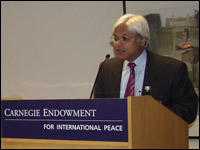Registration
You will receive an email confirming your registration.
IMGXYZ746IMGZYXOn June 22, 2007, the Carnegie Endowment launched a new, provocative policy brief, "Punching the U.S. Military’s 'Soft Ribs': China’s Antisatellite Weapon Test in Strategic Perspective," by Senior Associate Ashley J. Tellis. Jessica T. Mathews, president of the Carnegie Endowment, introduced the panel, which featured Dr. Tellis as the presenter, Dr. Michael D. Swaine, Senior Associate in Carnegie’s China program, and Dr. Peter Hays, Senior Policy Analyst with the Science Applications International Corporation, as discussants.
In his presentation, Tellis focused on the motivations and the wider strategic implications of China’s anti-satellite test (ASAT). Tellis challenged the conventional wisdom that China’s ASAT test was a protest against U.S. space policy, arguing instead that it was part of a well-considered strategy that China is pursuing for at least a decade now to combat U.S. overall military superiority.
Facing the hard reality of Chinese relative military weakness vis-à-vis the United States and a real possibility of a war with the United States, Tellis argued that Chinese analyses of U.S. military operations since Desert Storm have concluded that U.S. military might depends inordinately on space-based systems for its operational effectiveness. Since these systems are vital for effective U.S. military campaigns, but are also vulnerable, China has concluded that they must be targeted if it is to be able to stand up to the enormity of U.S. conventional military power.
Tellis argued that arms control advocates, while correct about the utility of an arms control solution for space for the United States and other countries, are mistakenly expecting China to give up its best hope for prevailing against the superior conventional military power deployed by the United States. He further explained that Beijing’s attitude towards space arms control will change only when one or more of the following conditions hold: China acquires the capacity to defeat the United States despite its privileged access to space; Chinese counterspace investments in space begin to yield diminishing returns because of nullification by U.S. countercounterspace capabilities; the space race intensifies to the point where the threats posed by any American offensive counterspace programs exceed the benefits accruing to Beijing’s own comparable efforts; or, the risk of conflict between a weaker China and any other superior military power, such as the United States, disappears entirely.
Since these conditions will not be realized anytime soon, Washington should certainly discuss space security with Beijing, Tellis believed, but not expect that its negotiating investments will yield any successful agreements now. Instead, the United States should accelerate investments in mitigating solutions that enhance the security of its space assets, in addition to developing its own offensive counterspace capabilities. Though the U.S. should continue to keep space free of weapons, it has no choice but to run the offence race and win if its space assets are threatened.
Dr. Hays, speaking from the Defense Department’s perspective, highlighted the dangers emanating from the debris from the ASAT's hitting space satellites and other installations. Agreeing with Tellis’ assertions about the Chinese assessment of America's immense dependence on space-based assets, he also expressed pessimism about the possibility of an arms control regime in space. Dr. Swaine agreed with Tellis that (1) China’s anti-satellite program is largely directed towards the U.S. and its commitment to defend Taiwan; (2) these developments make the possible future conflict scenarios over Taiwan much more complicated; and (3) the United States must devise countermeasures to deal with them. However, he questioned the certitude with which Tellis asserted that the Chinese would not negotiate any arms control treaty with the United States.
Dr. Swaine argued that the nature of the political relationship between the United States and China would be a very important determinant of how the Taiwan issue evolves, and the costs involved in a U.S.-China conflict. Given the immense difficulty in attacking and defending high-altitude space assets, he asserted that there is a possibility of affecting the Chinese decision and bringing them to the table to discuss an arms control regime. He further questioned Tellis’ assertion that space-based strategies were the only way for the Chinese to counter U.S. military superiority, especially in the Taiwan context, pointing to the wide array of military and political strategies being deployed by the Chinese.
Suggesting that the Chinese were more concerned about their international image and reputation than is widely believed, Swaine claimed that their pledge to not conduct further tests was an implicit recognition of the costs of pursuing this path. At the same time, he recommended that to counter Chinese offensive capability, the U.S. should strengthen its own capabilities, make its space systems redundant and easy to replace, avoid weaponizing space, develop rapid launch capability, and talk to the Chinese.
In the discussion that followed, Tellis defended the realist underpinnings of his argument by asserting that U.S. interests in space could only be preserved by negotiating with the Chinese from a position of superiority in terms of capability. The panelists also expressed optimism that there were some signs of willingness in the Bush administration to establish rules of the road, or a code of conduct, at the very least, for the use of space. However, they maintained that it would be hard to have an international, verifiable, and binding agreement among all the involved parties, given the tendency for all sides to hedge their bets. Indian and Japanese concerns about the debris and the security of their space assets were also discussed. On the issue of enhanced civilian space cooperation with China in the wake of the ASAT tests, one of the panelists pointed to U.S. concerns about the technology transfer that such cooperation could involve. It was conceded that the defense establishment lacked the organizational readiness, as well as a line of responsibility, to conduct a systematic assessment of threats and capabilities in space.
